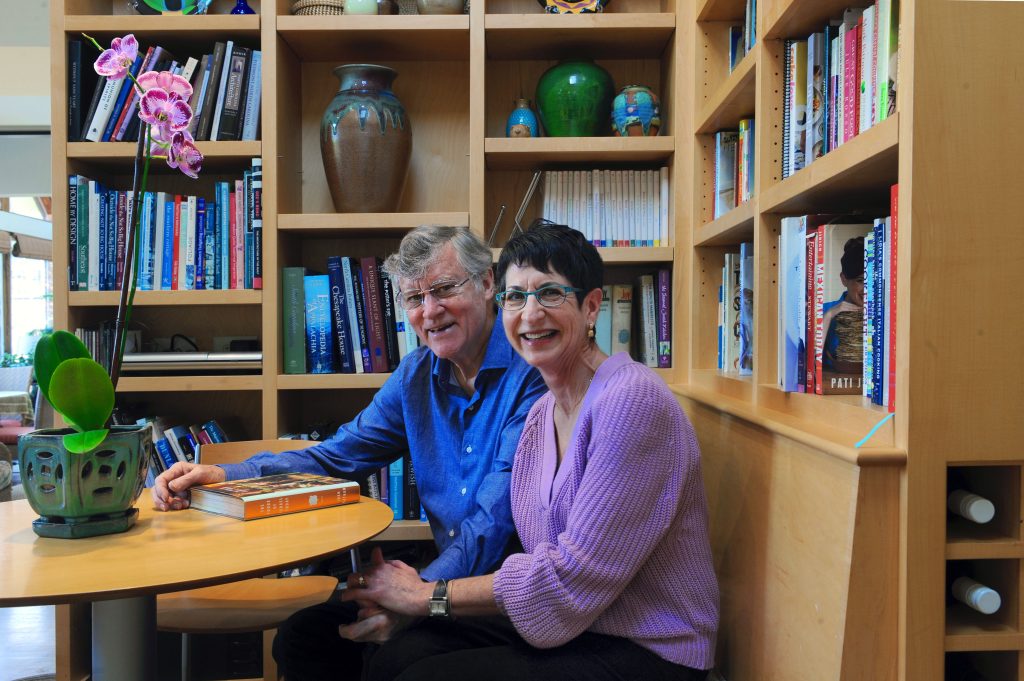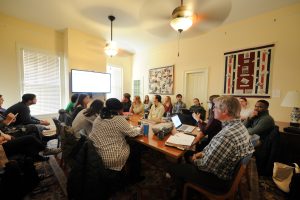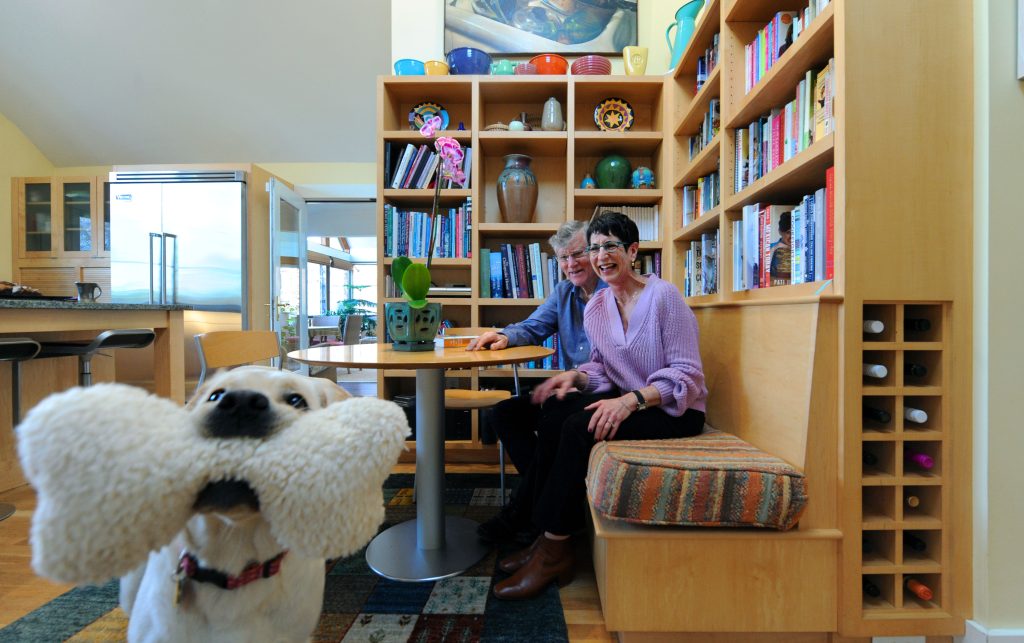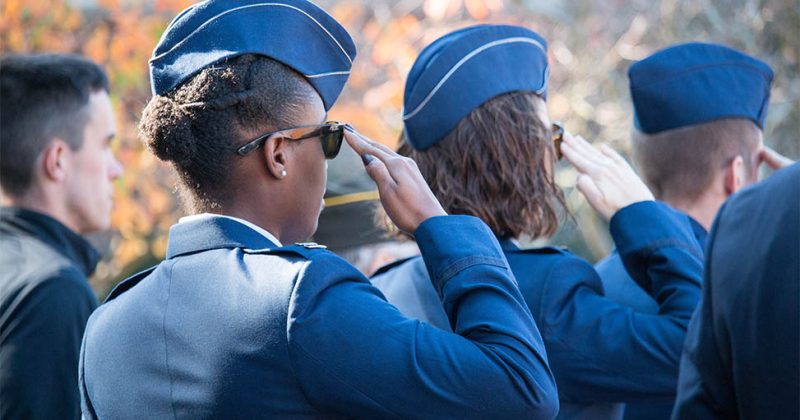
Bill and Marcie Ferris, in the kitchen of their Chapel Hill home, will retire at the end of the spring semester, but Bill promises “we’ll continue our support for students and for UNC." (photo by Donn Young)
Faculty couple Bill Ferris and Marcie Cohen Ferris are retiring, but their collective contributions to Southern studies and support for the university they love is far from over.
On a cold morning last fall, professors Bill Ferris and Marcie Cohen Ferris were sitting in the cozy kitchen of their downtown Chapel Hill home, reflecting on being recruited to Carolina in 2002. Mugs of coffee and plates of homemade blueberry bread helped to keep the conversation flowing, with periodic interruptions from dogs Roper and Albe, who were playing at their feet.
The kitchen is often the spot for end-of-class gatherings. Note the directions given to students: “We have two exuberant white labs who are over-the-top with energy and love. Be prepared for uncontrollable jumping and face-licking.”
In 2001, Bill, an authority on Southern literature, folklore and blues music and an accomplished documentary photographer/filmmaker, had just finished a four-year stint as chair of the National Endowment for the Humanities, appointed by President Bill Clinton. Marcie, a scholar of food studies, Jewish studies and material culture, was wrapping up a Ph.D. in American studies at George Washington University.
Then-Chancellor James Moeser went to visit Bill in his Washington, D.C., office to see if he would be interested in a position at UNC, as the Joel R. Williamson Eminent Professor of History and senior associate director of the Center for the Study of the American South. (Bill had founded the Center for the Study of Southern Culture at the University of Mississippi, the nation’s first regional studies center.)
“I told Chancellor Moeser I would be honored, that I had spoken at UNC, and it was the crossroads for my field, which is the study of the South,” said Bill, who is a native of Mississippi.
“The day we drove from Washington to Chapel Hill, we were listening to bluegrass on WUNC radio. It was a Saturday night, and ‘Back Porch Music’ was on,” added Marcie, who grew up in Arkansas. “We looked at each other and said, ‘This sounds right. This feels right.’”
Moeser said Bill and Marcie, who will retire at the end of the spring semester, “are both great teachers. Students flock to their classes. They have brought great distinction to Carolina, which is, unquestionably, the center of the universe in Southern studies.”

Support for UNC’s press and archives
In a TEDx talk in Durham in July 2016, Bill shared, “I love to tell my students an African proverb that says, ‘When an old woman or man dies, a library burns to the ground.’ It’s with that sense of urgency that folklorists preserve the stories, the places and the memory of the South.”
That sense of place is a powerful thread that runs throughout much of the Ferrises’ scholarly work. Indeed, when you meet Bill and Marcie, one of their first questions is often, “Where are you from?”

They have produced five award-winning books between them on various aspects of Southern history and culture since coming to Carolina — all of them with UNC Press. Marcie wrote Matzoh Ball Gumbo: Culinary Tales of the Jewish South (2005) and The Edible South: The Power of Food and the Making of an American Region (2014), and Bill’s informal trilogy is Give My Poor Heart Ease: Voices of the Mississippi Blues (2009), The Storied South: Voices of Writers and Artists (2013) and The South in Color: A Visual Journal (2016).
Elaine Maisner has been the couple’s acquiring editor on all five books.
“Bill and Marcie are very open to discussion and being edited but — and as an editor, I prize this — they both have very well-developed visions for what they want to do and of the impact and importance of their projects,” she said. “Visual culture is often just as important as textual culture in their work.”
Marcie has served on the press’ board of governors, and Bill has helped to broker connections with other writers, often encouraging them to send in book proposals. (As former folklore student Katy Clune notes: “Bill has the world’s biggest Rolodex.”)
That same support of UNC Press extends to the University Libraries’ archives, particularly the Southern Folklife Collection and the Southern Historical Collection.
“That’s such an important piece for me about Bill, his deep connection and love for the archives and the library,” Marcie said. “They’ve put up with Bill’s vigilance. He produces an incredible volume of stuff.”
Aaron Smithers, an assistant in the folklife collection, can share specifics about the size of Bill’s “stuff,” which “is over 400 linear feet, about 200,000 items … films, sound recordings, letters, personal papers, prints and negatives, fieldwork interviews and more.” (In photographic materials alone, there are about 10,000 prints and negatives and 16,000 color slides.)
“The thing about Bill is he is a documentarian who’s very interested in creating content beyond his own vision,” Smithers said. “That’s something that has driven and inspired a lot of his work, that belief that there is use in him capturing things that may benefit other researchers.”
Tom Rankin, a fellow documentary photographer, filmmaker and folklorist, is a professor of the practice at Duke University. He has known Bill since the early 1980s. He helped him winnow his massive photo collection in the UNC archives down to the 100 color images featured in The South in Color. Bill has been taking pictures since age 12, when he got a Kodak Brownie Hawkeye camera for Christmas.
“Bill is so intuitive about what he documents,” Rankin said. “He responds in the moment, freshly and naturally and instinctively. … His pictures tell a story. In an age where everybody has a camera at their disposal, Bill is driven by what’s happening first, and the camera is his tool.”
Marcie’s family papers are also in the archives, and Bill is always working with library staff to secure new collections. They both rely heavily on library resources for their classes and take students for research trips to Wilson Library. Their daughter, Virginia, a graduate of UNC’s School of Information and Library Science, has carried on the family passion; she’s an archivist at NC State.
“For me, it’s like being a kid in a candy store. I have all of these ideas, but no other place would allow you to realize them,” Bill said. “Beginning with my own collection, which was sitting on dusty shelves for most of my life — they’re now digitizing and streaming these materials online, making them accessible to me and to the world.”

Impact on the field of Southern studies
Harry Watson, Atlanta Alumni Distinguished Professor of Southern Culture, was director of the Center for the Study of the American South when Bill was hired. He said Bill really helped the center “come alive,” acting as “a spark plug for all kinds of ideas and projects,” from consulting on cultural tourism ventures like the Earl Scruggs Center in Shelby to forging partnerships with the Historic Black Towns and Settlements Alliance.
Bill’s massive online open course, “The American South: Its Stories, Music and Art,” developed through Coursera, has reached approximately 27,000 students around the world.
Watson also got to observe Bill as a teacher, since many of his on-campus classes meet in the Love House and Hutchins Forum, the historic house on Franklin Street that serves as the home for the center.
“Bill has an eclectic curiosity and imagination, and he can charm the birds out of the trees. He opens up possibilities where other people see impossibilities — and students love that,” Watson said. “Bill is not there to lecture them about what they can’t do; he really wants to hear about what they can do. They get permission from him to stretch their wings in a way that honestly is rare.”

For the past several years, Watson has served as co-editor with Marcie of Southern Cultures, the journal published by the center. Watson helped to found the journal in 1993. As a historian, he said it’s been rewarding to work with a colleague who approaches potential journal topics from a different perspective.
“Marcie has helped to steer the journal in more cultural directions, to open up other avenues,” he said.
Watson said their greatest contribution to UNC has been in the growth of Southern studies across the University. It’s an area of concentration in the department of American studies. Marcie helped to recruit that department’s current chair, Elizabeth Engelhardt, the John Shelton Reed Distinguished Professor of Southern Studies. She first met Marcie when she was an early career scholar and Marcie was president of the Southern Foodways Alliance.
Marcie has helped to grow Jewish studies and food studies at UNC. Students can major in religious studies, with a concentration in Jewish studies, and they will be able to minor in food studies beginning in fall 2018.
“Marcie’s book Matzoh Ball Gumbo was at the forefront of what we do in Southern studies today, examining how global diasporas influence and continue to be a part of the story of the American South. It’s a book that was really forward-looking and intellectually weighty,” Engelhardt said. “And in The Edible South, I felt like there was no one else who could write that book and take a 500-foot view of change over time in a scholarly and cultural way.”
Mentorship of students

Josh Parshall was recruited to UNC to pursue a master’s in folklore while sitting on the deck of the Ferrises’ Chapel Hill home. He went on to pursue a Ph.D. in American studies, becoming one of the first two students in May 2017 to graduate from the new doctoral program. He’s now director of the history department at the Institute of Southern Jewish Life in Jackson, Miss.
“So many people will tell you ‘You meet Bill and Marcie Ferris, and good things will happen from there,’” said Parshall, who created a blues-concert-like poster along with fellow Ph.D. graduate Elijah Gaddis to celebrate their dissertations. That memento now hangs in Bill and Marcie’s home.
Clune (M.A. folklore ’15) works for the vice provost for the arts at Duke University. She said Marcie’s gift “is her willingness to teach other women in academia or the professional world how to navigate multilayered challenges, whether it’s writing a thesis or advocating for yourself at work.”
Clune said Bill has left a lasting impression “by the way he is in the world. He is someone who has accomplished an incredible legacy by being kind. He’s always willing to connect people, and that comes back in dividends much later. In today’s political context, where everything is so divisive, that’s a really important lesson.”

Penny Rich, an Orange County commissioner who has a personal chef business, has catered end-of-class gatherings in the couple’s kitchen for a dozen years, introducing students to healthy local food and Jewish specialties like pecan kugel.
“They are extremely caring of their students,” she said. “At the end of the day, when we’re cleaning up, Marcie always encourages the kids to take home leftovers. It’s just second nature for them.”
Marcie said it’s been rewarding to collaborate with many of those former students as colleagues, taking that professor-student relationship to a new level.
“They are working for crucial arts and historical organizations and with publications and important news venues,” she said. “These are really significant professional spaces in a changing and evolving South, and these former students are now leaders and important voices for the humanities.”

A new chapter
After 16 very fruitful years at UNC, they both say it’s time to explore the next phase in their lives. They want to spend more time traveling and having extended visits with family — Marcie’s vibrant mother, Huddy Cohen, lives in town — as well as devoting their energy to new professional adventures and opportunities. They wrap up their teaching duties this spring, but “we’ll continue our support for students and for UNC,” Bill promises.
Marcie has joined the Orange County Food Council and is working on another book on North Carolina’s contemporary food scene. Bill, the storyteller, has many more stories to tell. It’s in his DNA. (His grandfather lays claim to being raised on “cornbread and recollections.”) He is working on a number of projects, including curating an exhibition of civil rights photographs, many drawn from the UNC archives, to be held in Montpellier, France, in fall 2018. Dust-to- Digital, a company in Atlanta, is creating a boxed set of his films and recordings. He has been consulting with a group of Vietnamese scholars on developing a book modeled after the massive Encyclopedia of Southern Culture (1989), which he co-edited.
“In 1997, when I appointed Bill Ferris chair of the National Endowment of the Humanities, he was already a legend to those of us who revered his passion for documenting and explaining Southern culture,” former President Clinton said, in reflecting on the Ferrises’ work. “I knew he would protect and strengthen the NEH when it was under fire. He was made for the challenge, with his world-class storytelling and his ability to argue with good-natured humor.
“He and Marcie have made invaluable contributions to our understanding of both the interesting differences and the common humanity of America at its best.”
Awards & Accolades
The scholarship of Bill and Marcie Ferris has been widely recognized. Here are just a few of the major honors they have received.

Bill Ferris
- Charles Frankel Prize for the Humanities, bestowed by President Bill Clinton
- France’s Chevalier and Officer in the Order of Arts and Letters
- Blues Hall of Fame inductee
- Top Ten Professors in the United States by Rolling Stone
- American Library Association’s Dartmouth Medal

Marcie Cohen Ferris
- James Beard Foundation nominee for Matzoh Ball Gumbo
- UNC’s Tanner Award for Excellence in Undergraduate Teaching
- International Association of Culinary Professionals’ Jane Grigson Award
- Southern Living magazine’s “30 Incredible Women Moving Southern Food Forward”
- Smithsonian.com “Best Books about Food of 2016” for The Edible South
By Kim Weaver Spurr ’88
Published in the Spring 2018 issue | Features, Tar Heels Up Close
Read More

A plan and a partnership: $10 million gift supports strategic initiatives
John and Marree Townsend’s commitments to UNC-Chapel Hill over the…

UNC’s Air Force ROTC named best small detachment in Southeast
UNC’s Air Force ROTC Detachment 590 was recently named best…


